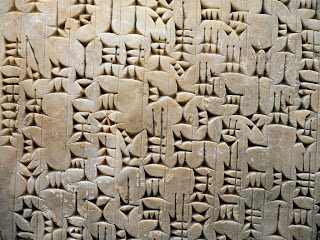Mormons believe that essentially everyone will make it to heaven, but heaven is not created equally. In fact, there isn't just one heaven, there are three, each with its own degree of glory. The highest heaven is the
Celestial Kingdom, which is typically compared to the glory of the Sun; the middle kingdom is the
Terrestrial Kingdom, which is typically compared to the glory of the moon; and the lowest glory, compared to the brilliance of the stars, is the
Telestial Kingdom.
Let's not get too caught up with the fact that this sun, moon, stars hierarchy does not reflect the actual height or distance of these heavenly bodies from the earth (otherwise the stars like Kolob would be our heavenly goal and the moon would be the lowliest of all glories), the comparison relies more on the amount of light given off with respect to our position. Fine.
What's most bizarre and most doubt-inducing for me is the etymology of the kingdoms' names. Calling something
celestial means that thing is either like or somehow pertaining to the sky. That works great for the Celestial Kingdom as long as you still believe in the idea of the
Firmament and
God living in the clouds, otherwise you get stuck trying to
reconcile the description of Kolob with current science.
The moon, as it turns out, is a horrible symbol for a place called the Terrestrial Kingdom.
Terra means earth in Latin. If you want the moon, call it the Lunar Kingdom. Anyway, just how exactly is the Terrestrial Kingdom supposed to be like or pertaining to the earth? I thought even the lowest degree of glory was supposed to blow our puny earthing minds.
The least glorious heavenly realm is special enough to get a made up name. Telestial, like
curelom and cumom, didn't exist as a word until Joseph Smith revealed it to us. The word seems to come from
tele-, which is a Greek prefix for distant or far away, but it could also be going back farther to the root
teleos, which means the end goal of a completed cycle, so basically the idea of perfecting a circle. If we go with the first possibility we get the notion that the Telestial Kingdom is the "Far Away Kingdom." Far from what? God? Hopefully not too far. If we go with the latter option, the Telestial Kingdom would seem to mean it's the designated end of the Plan of Salvation, but we all know that's not the case - the Celestial Kingdom is where we want to be. Maybe God should have given us his divine Adamic names for these places instead of misleading us with Latin and Greek.
It's pretty confusing. The meanings and explanations of these kingdoms come across as poorly thought out. And don't go to the temple hoping to sort things out. Take the rooms of the Salt Lake temple for example. You have the Creation [of the earth] Room, Garden [of Eden, which is on Earth] Room, World [a.k.a. Earth] Room, Terrestrial [= of the earth] Room, and the Celestial [heavens/sky/clouds] room. Why are there so many rooms for the same place? Why is there no discussion of the Telestial and Terrestrial Kingdoms in the temple, just a quick entrance through the veil into the Celestial realm? I thought the temple was where we go to learn the details of The Plan, but we're only given a partial view. So much for further light and knowledge!










